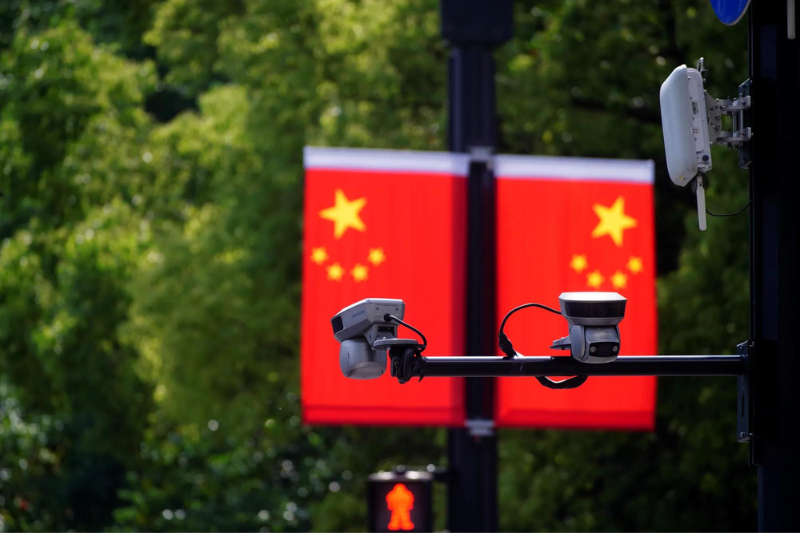
china’s skin colour analytics technology, threat to human rights
US-based security and surveillance industry research group, IPVM (Internet Protocol Video Market) presented a report cited by VOA, Dahua, a Chinese manufacturer of surveillance equipment, is selling cameras in Europe with what it calls a “skin color analytics” feature.
The company defended the analytics as being a “basic feature of a smart security solution,” according to the July 31 IPVM report that VOA Mandarin has access to.
The United States of America’s state-owned news network and international radio broadcaster, VOA, creates digital, TV, and radio content that is distributed all over the world.
According to IPVM and the Los Angeles Times, Dahua gave the Chinese police a video surveillance system with “real-time Uyghur warnings” in February 2021. These warnings included information about a person’s eyebrow size, skin tone, and ethnicity.
According to IPVM’s 2018 statistical report, contracts worth USD 1 billion have been awarded to Dahua and another Chinese video surveillance firm, Hikvision, since 2016 by the government of China’s Xinjiang province, which is home to the Uyghur community.
According to the report, “skin color/complexion” is one of the “human body characteristics” listed in Dahua’s ICC Open Platform guide. The “skin color types” that Dahua analytic tools would target are “yellow,” “black,” and “white,” according to the company’s “data dictionary.” This was confirmed by VOA Mandarin on Dahua’s Chinese website, according to VOA.
Skin color detection, a feature Dahua promotes as part of its Smart Office Park solution aimed at providing security for large corporate campuses in China, is also mentioned in the IPVM report under the “Personnel Control” category.
According to Charles Rollet, a co-author of the IPVM report, “Basically what these video analytics do is that, if you turn them on, then the camera will automatically try and determine the skin color of whoever passes, whoever it captures in the video footage,”
So, he continued, “That means the camera is going to be guessing or trying to figure out whether the person in front of it… has black, white, or yellow, in their words, skin color.”
According to the IPVM report, Dahua sells cameras equipped with skin colour analytics features in three European countries. Germany, France, and the Netherlands have all experienced racial tension in the recent past.
According to Dahua, the ability to analyze skin tones is a crucial component of surveillance technology.
“The platform in question is entirely consistent with our commitments to not build solutions that target any single racial, ethnic, or national group,” Dahua said in a statement to IPVM. One fundamental component of a smart security solution is the capability to broadly identify observable traits like height, weight, hair and eye color, and broad categories of skin color.
According to IPMV, the business has previously denied providing the aforementioned feature, and color detection is not frequently found in popular surveillance technology products.
There has been debate over mistakes caused by skin tone in surveillance technologies for facial recognition for a long time in many Western countries. The identification of skin tone in surveillance applications raises issues with civil and human rights.
As a result, Rollet said, “It’s unusual to see it for skin color because it’s such a contentious and ethically fraught field.”
According to Human Rights Watch (HRW) technology manager Anna Bacciarelli, Dahua technology shouldn’t include skin tone analytics.
Keep Reading
She wrote in the email that all companies have to respect human rights and take steps to stop or lessen any risks to human rights that may come up because of what they do.
She continued, “Surveillance software with skin tone analytics poses a significant risk to the right to equality and non-discrimination by allowing camera owners and operators to racially profile people at scale – probably without their knowledge, infringing privacy rights and should simply not be created or sold in the first place.”
The claim that Dahua’s surveillance products are made to make racial identification possible was refuted. Contrary to claims made by some media outlets, Dahua Technology has not and will never develop solutions aimed at any particular ethnic group, according to the website of its US-based company.
The Chinese technology firms Dahua and Hikvision, which have close ties to Beijing, were found to be a threat to US national security in 2022 by the US Federal Communications Commission.
The European Union adopted a revision proposal on June 14 for its draught Artificial Intelligence Law, which is a step towards outlawing the use of facial recognition technology altogether in public areas.
Svenja Hahn, a German member of the European Parliament and leader of the Renew Europe Group, told Politico that facial recognition technology “has no place in a liberal democracy” because it has been used for mass surveillance in China.
The US government has long outlawed racial discrimination against customers in industries like banking and healthcare. Law enforcement only is allowed to use the facial recognition services offered by IBM, Google, and Microsoft.
According to Rollet, “If the camera is filming at night or if there are shadows, it can misclassify people.”
Caitlin Chin conducts research on technology regulation both domestically and abroad as a fellow at the Centre for Strategic and International Studies, a Washington-based think tank.
The ability to categorize people based on their skin color on its own almost invariably results in discrimination, she told VOA, so this is something that’s both very dehumanizing and very concerning from a human rights perspective. In part because any errors in this technology that could lead to false arrests, could lead to discrimination.









